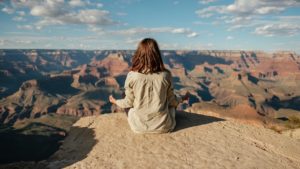Plummeting over 411 feet, Whitewater Falls is the kind of majestic force that demands an audience. Located in Sapphire, North Carolina, and considered the highest waterfall east of the Mississippi River, the falls are both awe-inspiring and deadly.
When you first arrive, it’s obvious that this natural wonder brings on-lookers of every kind: the young, the old, families, lovers, and friends. It’s often you see them picnicking, strolling, and snapping photographs, but as you venture further along the trails, the masses peel back, leaving the young and old behind. Soon you cease to hear their voices or feel their company, as the rustling leaves and distant roar of the falls replace them.
With each step, you know you are getting closer.
Once you arrive to the first clearing, where the tangled firs and longleaf pines separate, you see it: the massive falls of white as they beat on the layered rocks that split the woods and sky. But as you look closer along the opening, you see something else: a barricaded path and a weathered sign that reads “DANGER- Stream rocks are slippery. A slip above a waterfall can be fatal. Stay off the rocks and away from the edge. 18 people have died here.”
I know all of this because I have been there.
I jumped the barricade and traveled down the two-mile path for the first time when I was eighteen. I did it again at 21, 24, 28, and 29. And each time, I met something enormous on the other end. And it wasn’t just the waterfall.
To do it right, you have to wait until no one is around to witness you jump the barricade and disappear along the overgrown path. This isn’t very hard, but it does require a little bit of patience. Once you have your opportunity, it’s a rush as you cross the point of no return.
Along the path, there are stories to be told. I’ve climbed down to the top of Whitewater Falls with my sister, my husband, and a good friend. Good sense tells you that standing at the edge of a waterfall is not something you should do, but if you must, you certainly shouldn’t do it alone. With every step we took, we knew we were making our own stories. And yet I’d often find myself thinking about the lives of the 18 who died doing exactly what we were about to do. I would wonder if they were in love or in peril. If their plummets were intentional or accidental. I wondered if they were ever found and how long their loved ones cried for them.
After a while, you come to a small clearing on the right where there is usually some debris and ash, along with a few empty beer cans—all signs of a late-night bonfire left by the last crowd that defied the warning sign and jumped the barricade. That’s how you know you’re in the right spot to begin your climb down onto the rocks.
Just behind the camp-out is a small, dark burrow where the woods become thick and the path drops off at a sharp sixty degree angle. This is your entry point, a place where the real journey starts, and it’s one of the many reasons not to go it alone. Each time I have made it down onto the top of Whitewater Falls, I had help. We spot each other, pace each other. We hold each others’ hands as we make our way down… and down… and down again.
The further you go, the louder the waterfall becomes—to the point when you feel like you are yelling just to be heard. After some time, crawling down rock, stepping over roots, and clinging to hanging branches, you have made it to the final and most breathtaking clearing of them all. You, my friend, are a mere thirty paces from standing on the edge of Whitewater Falls.
And once you get there, you will never EVER be the same. I can promise you that.
Standing on the edge of nothing is nothing short of a miracle. Your limbs get really heavy-like and your heart jumps loud and hard in your throat. I guess it’s your body’s way of telling you it knows what you’re up to and it doesn’t like it one bit—but then again, it could be because everything is so expansive and extreme, and it’s your body’s way of being overwhelmed by beauty.
I’m fairly certain our bodies and souls intuitively know—more than our brains—that Nature has always demanded something from man that requires his life in exchange for her stunning indifference. It’s why mountain climbers like Rob Hall are willing to die ascending Mount Everest and why Christopher McCandless was called into the wild of Alaska—and died there, too.
THERE IS SOMETHING ABOUT NATURE THAT ENTRANCES US AND CAN TELL US THINGS NO ONE ELSE CAN. IT’S WHY WE STARE INTO FIRES IN A WARMED TRANCE AND GAZE ACROSS OCEANS AS THE SUNSET SPEAKS TO US. FOR ME, IT’S WHERE I FIND GOD MORE THAN ANYWHERE ELSE—MORE THAN IN SOCIETY OR IN CHURCHES. AND IT’S WHY STANDING ON THE EDGE OF WHITEWATER FALLS HAD THE POWER TO CHANGE ME AGAIN AND AGAIN:
Those moments on the edge and the way the sun transformed the flowing waters from golden to black and the way the air was sweeter there than anywhere else on earth changed me…
The way the ice-cold water engulfed my feet as I went barefoot in the streams where 18 others lost their lives changed me…
The sensation of crashing waters as they pulsated in my chest and the experience of looking down over the edge and feeling so very small and infinite all at once changed me…
And it’s those moments, all at once, that bring about several intangible takeaways that aren’t just my memories but a guide for my life. So, here’s what I learned standing on the edge of a waterfall:
Lesson #1- Hidden truths and beauties require us to leave the beaten path behind.
Too many times in the past, I’ve looked to others for acceptance or for the answers. As I’ve grown over the years, I’ve learned to stop doing that and look within instead. There’s nothing more powerful than a combination of good sense, intuition, and a lot of prayer. In order for you to find yourself or find the truth or find something at all, it often requires you to leave the beaten path and blaze your own trail. Don’t look to popular culture for the answers or the fickle acceptance of others. Instead, look within and look up. How you live your life is ultimately between you and God. When Steve Jobs gave his Stanford Commencement Speech of 2005, he told graduates this: “Your time is limited, so don’t waste it living someone else’s life. Don’t be trapped by dogma — which is living with the results of other people’s thinking. Don’t let the noise of others’ opinions drown out your own inner voice. And most important, have the courage to follow your heart and intuition. They somehow already know what you truly want to become. Everything else is secondary.” Now, I know how controversial he was, but when I heard Jobs deliver this speech, it changed me. It really did. In order to have my waterfall experience, I had to break a few rules, take a few chances, and go my own way. I couldn’t be constrained if I was going to stand on the edge and marvel. And trust me, it was worth it. So, listen to your heart, pray and reflect, ask the hard questions, and break a rule or two if you need to. Everything else is secondary, when you’re looking for yourself and waterfalls.
Lesson #2- The path isn’t always easy, and it’s not for everyone.
Be warned that there is nothing more lonely or difficult than striking out on your own. People will always have things to say about you and some will want to stop you because—somehow—the way you’re willing to live OUT LOUD and ALL THE WAY offends them. Your braveness, authenticity, and vitality remind them of the fact that your path isn’t their path. The “road not taken” isn’t for everyone. When I think about my own, sloppy life—the loneliness and pain and the search to find meaning—I am often reminded of something Hugh Macleod, writer and cartoonist, once penned. He said, at some point, we all must choose between being a wolf or a sheep. The price for being the sheep is boredom, and the price for being the wolf is loneliness. I love this comparison because it is so true. In life, there will be many sheep, and they will have each other but little of anything else. And although being the wolf will be a far more difficult and lonely path, the rewards of individual thought and independence will be worth it.
Lesson #3- But if you must go, it’s always better with a friend.
Of course it sounds like I am contradicting what I just said above about being the wolf and that the “road less traveled” isn’t for everyone, BUT if you can find a likeminded friend or your “person” then the journey for the edge of your waterfall will be that much sweeter. You will go further, be safer, create more stories together, and marvel over the beauty when you get there all the more. In my life, there have been moments that saved my life BECAUSE I had a friend along the way. In my journey to the edge I can think of one night in particular that if I didn’t have my person to call at 1:00 a.m. in the morning to come over and walk that path with me, I simply wouldn’t be here today. My person has walked the path with me, and she has stood at the very edge. SHE was the one gripping my hand when I slipped off the edge. She was the one to pull me back up. That’s why I say, blaze your own path, stand longingly at the edge of something, but by God good grace, if you can find a likeminded friend or your mate of the soul, bring them along. It’s sweeter, and it might save your life. And by the way, when you find them, never ever let them go. The bond that I have with my “person” is one that will last a lifetime. She saved me once, and if she needs me to, I will do the same for her.
Lesson #4- Standing on the edge may bring us within an inch our lives but it also stirs us to life.
And that is good. Sometimes in life, we get far too complacent and refuse to take chances because we want to stay safe and comfy. We want to fit in. We want to be socially acceptable. We want approval. The truth is we want these hollow things so badly that we forget what it is we truly want. Sadly, I am the poster child of safe and comfy, so I am speaking from experience here. But it’s in my understanding of myself that I can fight the good fight against settling for less and fearing the unknown. Now, I am not saying you need to go stand on the edge of a waterfall to have the same realizations. But I am saying to find your authentic “edge” and go stand on it. Look around, wait to hear something, take inventory. I can’t tell you what your edge is or what to think or feel once you get there. But whatever you do, let it change you. For some of us, it’s finding God in a hospital bed or leaving a toxic relationship. For others it’s walking away from an unfulfilling job or beating cancer—it’s finally going back to school or telling the truth for the first time in a long time. Yes, there is a chance we might lose everything on the edge, but there’s also a chance we finally come back to life. Sleepwalking through our lives isn’t living, and sometimes the only way to wake up is to do something drastic, something that catches your breath or takes it away.
One Final Thought
Once you’ve stood on the very edge of something, expect to be changed. When I looked down over the edge of Whitewater Falls, I felt the heaviness of choice. One step, either forward or backward, would change everything for me. And isn’t that what life is all about? Making choices?
In one of my favorite T.S. Eliot poems, “The Love Song of J. Alfred Prufrock,” Eliot pens something so stirring, as the speaker laments lost opportunities and lost time, that I often find myself mulling over the irony of our lives in heavy traffic or on sleepless nights:
“…And indeed there will be time…
Time for you and time for me,
And time yet for a hundred indecisions,
And for a hundred visions and revisions…
Do I dare
Disturb the universe?
In a minute there is time
For decisions and revisions which a minute will
reverse…”
You see, like Prufrock, we all think we have time. And we all think that sometimes we don’t have to make a choice. But time is actually very short and our “hundred indecisions” are decisions nonetheless. Our indecisions are the decisions NOT to change. NOT to try something new. NOT to truly live. NOT to seek God after many dark years. NOT to stand on the edge and blaze our own paths.
We are all walking with time, as it passes faster than it did in our silly youth, whether we are aware of it or not. So if you ask me, “Do I dare disturb the universe?” I will say YES! YES, you should! And if you were standing here with me now, I’d tell you to go and stand on the edge of your waterfall and see what you can find.
Godspeed to you, dear traveler.






